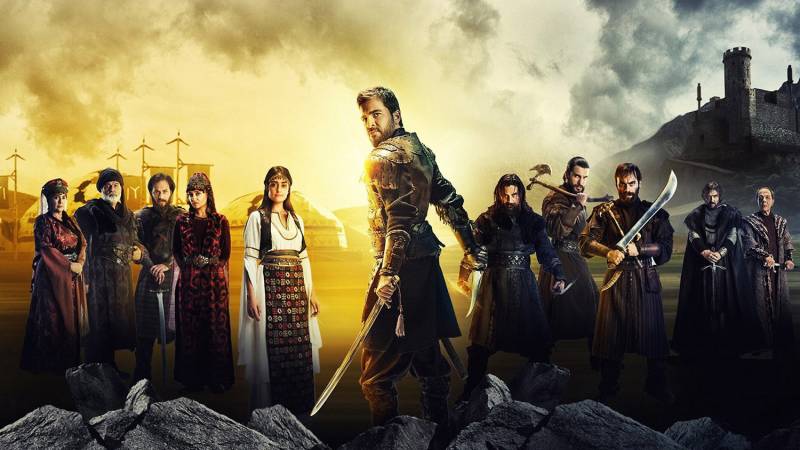In the midst of the chaos in today’s political shift, a new geo-political power in the Muslim world is emerging. Turkey and Pakistan have cultivated the strongest diplomatic ties since 1947; both economically and politically, but their cultural relations seem to be the most interesting outcome of this.
When Fatima Bhutto wrote about Turkey conquering Pakistan, I agreed wholeheartedly. Esra Bilgic, the Turkish female star of Ertugrul is currently dominating the limelight in Pakistan, she is the fresh face of corporate advertisements, fashion brands and has quickly garnered a massive Pakistani fan base on social media.
Turkish actors such as Cavit Cetin have visited Pakistan in September, igniting media frenzy, and it is evident that there is a significant Turkish presence emerging in Pakistan. This occurs after the Turkish show Ertugrul became an overnight success in Pakistan, quickly accumulating a massive viewership, making it the most popular show on Pakistani Netflix.
The values and stories of the Ottoman Empire certainly seem to be entertaining the hearts and minds of the people of Pakistan. Even more so, Imran Khan, the Prime Minister of Pakistan is an open admirer of the show and the rich history of the Ottoman Empire. In fact, it was his idea alone to broadcast the show on Pakistan state television, PTV. He published a video about the show and stated in the video that it would “make our youth learn about Islamic history and ethics”.
Indeed, Turkish influence is capturing the nation's attention and today, the question many people today are asking is: are Turkey’s diplomatic ties remodeling Pakistan’s soft power?
Interestingly enough, Khan has banned Bollywood films and Indian media, whom Pakistan shares a deep history with. Instead, he has welcomed and pushed for Muslim counterparts. It can be argued that Khan is focusing on creating a secular, Islamic state, and he aims to do this by enhancing its cultural ties with Turkey, and importing its version of Islam and political values to Pakistan; his decision of airing various multiple Turkish shows are evident of this.
Khan’s vision of Pakistan lies way beyond economic and military might. He aims to remodel Pakistan’s soft power through deepening Turkish and Pakistani ties through cultural and political exchange, and it seems to be working—something which no former Pakistani Prime Minister has ever done, making him an anomaly.
To further understand the geopolitical implications of the rise of Turkish and Pakistan’s cultural relations, the concept of soft power must be understood. Joseph Nye was the forefather of soft power and in International relations it is usually defined as using appeal and attraction using cultural phenomenon, rather than military and economic action.
Since the country’s inception, it has suffered from terrorism, intolerance within its religious community, the presence of Wahhabi terrorism, and blasphemy laws, often making it an undesirable state to visit or politically align with. Further, the country suffers from sectarian divide, which is leading to severe religious intolerance.
Pakistan is not the safest of places for religious minorities; in fact the condition of religious minorities is one which almost treats them as second class citizens. This is because Pakistan has particularly maintained its stance of having discriminatory laws, such as blasphemy laws against non-Muslims. We have all heard the story of Asia Bibi.
Pakistan was subjected to shameful scrutiny in the international arena, particularly from Western governments and human rights organisations. Human Rights Watch called for the blasphemy laws to be abolished and petitions were created calling for her freedom and safety.
In response to the international outcry against Pakistan’s blasphemy laws, Asia Bibi found refuge in Canada, which welcomed her with open arms. But ultimately her ordeal tarnished Pakistan’s global image, especially in the Western world, which values itself for its tolerance and religious diversity.
Pakistan’s remodeling of soft power within the International world, would mean giving Pakistan another chance at international diplomatic success and a positive image providing it with a fresh narrative of secularism, pluralism and tolerance. Moreover, it may help heal the country from its religious divide and sectarianism which is plaguing it.
Erdogan’s Turkification process, and expansionist ideas may just be the key, to the beginning of the secularization of Pakistani society. Turkey, though a country which prides itself of its Islamic history and culture, is still secular; a 1928 amendment of the constitution, separated the religion of Islam from the Turkish state. The Turkish constitution also recognises freedom of religion, ultimately displaying itself as a state which values tolerance and pluralism. Turkey has suffered less from religious sectarian conflict, and welcomes tourists from all over the world to enjoy its paramount beauty and rich culture of the Ottoman Empire.
As a young British Pakistani, whilst also being a Muslim, I have been raised within liberal and secular values. Do I believe that a secular society is the correct way to safeguard the future for Pakistan? Absolutely. In fact, this might be the only way Pakistan can achieve international solidarity, whilst it remains on its quest to become a prominent leader in the Muslim world.






